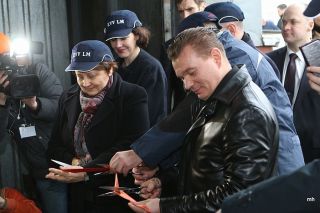Investments, Latvia, Legislation, Markets and Companies, Metals Market
International Internet Magazine. Baltic States news & analytics
Sunday, 01.02.2026, 13:10
Krishtal: KVV was provided with inaccurate information during acquisition of Liepajas metalurgs
 Print version
Print version |
|---|
He says that the acquisition deal lacked directness regarding specific aspects, which later on left a huge impact on the plant's further operations.
When asked whether the insolvency administrator provided KVV Group with all the necessary information during the acquisition process last year, and whether KVV Group did a full investigation on the plant, Krishtal said that KVV Group sent a commission to the factory to assess the technical condition of the plant's equipment. The commission declared that the equipment was in good technical condition.
"Imagine a situation: a factory is being sold. If both the seller and buyer are business structures, then the former one is tasked with deceiving the latter one, claiming that this is the best asset the seller has ever had. In this case, we believe that the seller was linked to the government. We believe that the seller was obliged to say: look, there is the factory, however, you will have no access to oxygen there; i.e. – you can look at the oxygen plant, but it does not belong to you, and you will be unable to start the factory if you do not make an agreement with the oxygen plant's owners," said Krishtal.
He said – had it been said, the acquisition process would have likely gone a different direction – with a different price and terms. "We were told that Liepajas metalurgs was a shareholder of the oxygen producer Elme Messer, and that we would be able to agree on the oxygen supply price according to our own terms. We were told that they had nowhere to go, as the plant is located on the factory's territory, and its owners would be glad to agree on a price that was beneficial to us. We failed to verify this," said Krishtal.
He agreed that this information had to be verified, however, KVV Group decided to trust the seller.
"In reality, everything turned out to be different. We were told: if you want to buy the oxygen plant, it will cost five times more. Had these negotiations with the oxygen producer been held before the acquisition of the factory, it is likely that we would have not bought it. But if we had, then for a price that is EUR 12 million lower," explained Krishtal.
Asked whether the Ukrainian investors feel deceived, Krishtal said that the issue concerns lack of directness regarding specific aspects that later on had a huge impact on the factory's further operations.
He also said that KVV Group was provided with inaccurate production output coefficients.
"The coefficient was 1.12, however, upon starting the furnace, it turned out that the actual coefficient was 1.16 – 1.17. In other words, we assumed that the production output would be 900 kilograms of produce, but in reality, the output was 850 kilograms. [..] We concluded that the figures and calculations were inaccurate. This affected the actual costs of production even more," added Krishtal.








 «The Baltic Course» Is Sold and Stays in Business!
«The Baltic Course» Is Sold and Stays in Business!

